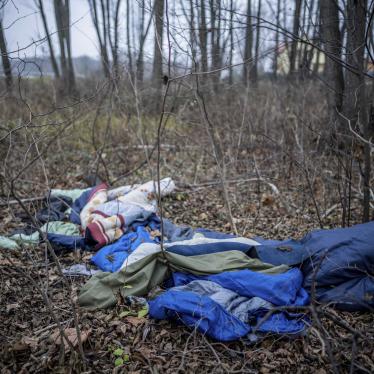(Brussels) – The European Union’s support for abusive governments to keep migrants and asylum seekers far away during 2021 exemplified the yawning distance between the bloc’s rhetoric on human rights and its actual practice, Human Rights Watch said today in its World Report 2022. Prime examples are the militarization and humanitarian emergency at the Belarus-Poland border, and pushbacks at other external EU borders.
“We often see the European Union’s commitment to human rights falter when the going gets tough,” said Benjamin Ward, deputy Europe and Central Asia director at Human Rights Watch. “At a time when people are suffering and their rights are threatened inside and outside EU borders, we need an EU willing to stand up for them.”
In the 752-page World Report 2022, its 32nd edition, Human Rights Watch reviews human rights practices in nearly 100 countries. Executive Director Kenneth Roth challenges the conventional wisdom that autocracy is ascendent. In country after country, large numbers of people have recently taken to the streets, even at the risk of being arrested or shot, showing that the appeal of democracy remains strong. Meanwhile, autocrats are finding it more difficult to manipulate elections in their favor. Still, he says, democratic leaders must do a better job of meeting national and global challenges and of making sure that democracy delivers on its promised dividends.
Human Rights Watch highlighted union-wide concerns on migration and asylum, discrimination and intolerance, poverty and inequality, rule of law, and EU foreign policy. The World Report includes chapters on France, Germany, Greece, Hungary, Italy, Poland, and Spain, and on non-EU countries in the region such as Bosnia and Herzegovina, Serbia, Kosovo, and the United Kingdom.
Respect for the rule of law eroded in a number of EU countries during the year. Poland and Hungary came under continued scrutiny for attacks on the rights of LGBT people, judicial independence and media freedom, women’s rights, and civil society groups including women’s rights defenders. There was some evidence of a stronger response from some EU institutions to the situation in Hungary and Poland, including rulings by the EU Court of Justice.
But while EU member states used stronger rhetoric to criticize attacks on the rule of law and democratic institutions inside the EU, they fell short of decisive action available under the Article 7 procedure provided by the EU treaties or fully activating systems to condition funding on complying with EU principles.
EU countries made little progress on developing rights-respecting migration policies or sharing responsibility equitably for migrants, asylum seekers, and refugees, showing consensus only on sealing borders and externalizing responsibility at the expense of human rights. Though EU countries evacuated thousands of Afghans from Kabul in August, they made resettlement pledges short of the need, and continued to cooperate with countries like Libya, despite the evidence of serious abuses against migrants and refugees. The EU border agency Frontex resists calls for accountability, with mounting evidence of responsibility for abuses and failure to investigate.
Croatia, Greece, Cyprus, Hungary, Slovenia, Spain, Lithuania, Latvia, and Poland engaged in pushbacks, with the latter three amending national legislation to give these unlawful practices legal cover. Denmark adopted a law allowing it to send asylum seekers to another country for the examination of their claims and set a dangerous precedent by removing the “temporary protection” status of people from Damascus or Damascus Countryside. French authorities inflicted degrading treatment on migrants at the UK-France border in a misguided policy to deter arrivals in Northern France. Groups defending the rights of migrants and refugees in Greece, Italy, and Cyprus, among others, faced a hostile environment, including prosecution.
State responses to racism, violence, and discrimination, affecting women, ethnic and religious minorities, LGBT people, and people with disabilities, were often inadequate and in some cases exacerbated rights abuse. The Covid-19 pandemic fueled discrimination and hate crimes, including online hate speech targeting particular social groups. The EU Fundamental Rights Agency and the Council of Europe Commissioner for Human Rights said that EU countries should tackle structural discrimination, including ethnic profiling by the police. In a positive move, the European Commission adopted a strategy for the rights of people with disabilities through 2030.
The Covid-19 pandemic exacerbated deep inequality and poverty in the European Union, despite a major EU recovery budget with funds dedicated to addressing social exclusion and mitigation measures by individual countries. Official estimates suggested that roughly one-fifth of the EU population was at risk of poverty or social exclusion. Food bank use and child poverty increased, measures to offset rising energy costs appeared insufficient, and Roma people remained at disproportionate risk of living in poverty and social exclusion.
The EU obstructed critical measures to ending the Covid-19 pandemic by opposing proposals to temporarily waive intellectual property and trade rules that could facilitate worldwide production and availability of Covid-19 tests, treatments, and vaccines.
The European Commission adopted legislative proposals in July to achieve climate neutrality by 2050, including a 55 percent emissions reduction goal for 2030, but the European Parliament voted to prolong gas subsidies until 2027, undermining these efforts. The 27 members of the EU collectively are among the top 10 greenhouse gas emitters globally, contributing to the climate crisis around the globe.
The EU and several states continued playing leading roles on UN initiatives related to human rights in countries including Afghanistan, Belarus, Sudan, Ethiopia, Syria, Sri Lanka, Myanmar, Nicaragua, North Korea, and on climate change. But the EU’s unanimity rule in foreign policy often prevented decisive action to address, or even denounce, serious human rights abuses, including most notably concerning countries like Egypt, Israel, Gulf countries, and India.
Expressions of concern were often formulated only during bilateral human rights dialogues, whose impact on fostering positive change remains highly questionable. Pushed by the European Parliament, the EU is working to adopt landmark legislation on mandatory human rights and environmental due diligence for companies. The EU is also reforming its generalized scheme of preferences (GSP), which grants third countries preferential access to the EU market linked to various forms of human rights conditionality.








